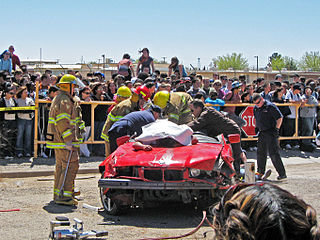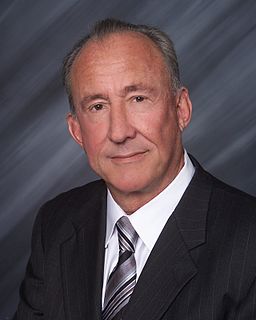 W
WDriving under the influence (DUI) is the offense of driving, operating, or being in control of a vehicle while impaired by alcohol or other drugs, to a level that renders the driver incapable of operating a motor vehicle safely.
 W
WAlcohol advertising is the promotion of alcoholic beverages by alcohol producers through a variety of media. Along with tobacco advertising, alcohol advertising is one of the most highly regulated forms of marketing. Some or all forms of alcohol advertising are banned in some countries. There have been some important studies about alcohol advertising published, such as J.P. Nelson's in 2000.
 W
WBlood alcohol content/concentration (BAC) is a measurement of alcohol intoxication used for legal or medical purposes. A BAC of 0.10 means that there are 0.10 g of alcohol for every 100 ml of blood which is the same as 21.7 mmol/l. A BAC of 0.0 is sober, while in the United States 0.08 is legally intoxicated, and above that is very impaired. BAC levels above 0.40 are potentially fatal.
The Bob campaign aims to raise awareness of the dangers of drink-driving; drivers with high blood alcohol content are at increased risk of car accidents, highway injuries and vehicular deaths. Alongside the general information that is offered during the campaign, there is an increased police surveillance, especially during the weeks running up to Christmas and New Year's Eve. Most of all, the campaign focuses on a designated driver approach.
 W
WA breathalyzer or breathalyser is a device for estimating blood alcohol content (BAC), or to detect viruses or diseases or difference types of meat from a breath sample.
 W
WOn the night of June 12, 2020, Rayshard Brooks, a 27-year-old African American man, was fatally shot by Atlanta Police Department (APD) officer Garrett Rolfe. APD officer Devin Brosnan was responding to a complaint that a man (Brooks) was asleep in a car blocking a Wendy's restaurant drive-through lane. At the scene, Brosnan radioed for assistance, and Rolfe arrived some minutes later. Rolfe conducted a breathalyzer exam which indicated that Brooks's blood-alcohol content was above the legal limit for driving. Rolfe and Brosnan began to handcuff Brooks, and Brooks grabbed Brosnan's taser and attempted to run away. Rolfe pursued Brooks on foot, and Brooks half-turned and fired the taser toward Rolfe's head. Rolfe then fired his weapon three times at Brooks, hitting him twice from behind. A third shot struck an occupied car. Brooks died after surgery.
 W
WJerry Jerome Brown Jr. was an American football linebacker who played for five different teams combined in the National Football League, Arena Football League and Canadian Football League. In college, he played on the defensive line for the University of Illinois. In his professional career, he was a member of the Hamilton Tiger-Cats of the Canadian Football League, the Jacksonville Sharks and San Antonio Talons of the Arena Football League and the Indianapolis Colts and Dallas Cowboys of the National Football League. He was signed as a free agent by the Jacksonville Sharks in 2011 and was a contributor to the Sharks victory in ArenaBowl XXIV by having one tackle assist, a forced fumble and a fumble recovery.
 W
WThe Criminal Law Amendment Act, 1968–69 was an omnibus bill that introduced major changes to the Canadian Criminal Code. An earlier version was first introduced as Bill C-195 by then Minister of Justice Pierre Trudeau in the second session of the 27th Canadian Parliament on December 21, 1967. Bill C-195 was modified and re-introduced as Bill C-150 by then Minister of Justice John Turner in the first session of the 28th Canadian Parliament on December 19, 1968. On May 14, 1969, after heated debates, Bill C-150 passed third reading in the House of Commons by a vote of 149 to 55. The bill was a massive 126-page, 120-clause amendment to the criminal law and criminal procedure of Canada.
 W
WThe terms "designated driver" and "designated driving" refer to the selection of a person who remains sober as the responsible driver of a vehicle whilst others have been allowed to drink alcoholic beverages.
 W
WDrunk driving is the act of driving under the influence of alcohol. A small increase in the blood alcohol content increases the relative risk of a motor vehicle crash.
 W
WDrug–impaired driving, in the context of its legal definition, is the act of driving a motor vehicle while under the influence of an impairing substance. DUID, or Driving Under the Influence of Drugs, is prohibited in many countries. Several American states and European countries now have "per se" DUID laws that presume a driver is impaired if they are found to have any detectable quantity of controlled substances in their body while operating an automobile and that the driver has no doctor's prescription for the substance. This is similar to the "per se" DUI/DWI laws that presume a driver is impaired when their blood alcohol content is above a certain level. There is some controversy with "per se" DUID laws in that a driver with any detectable quantity of controlled substances may not in fact be impaired and the detectable quantity in blood or sweat may be only the remnants of drug use in days or weeks past. It is against road traffic safety.
 W
WEvery 15 Minutes is a two-day program focusing on high school juniors and seniors, which challenges them to think about driving while drunk, personal safety, and the responsibility of making mature decisions. Along with alcohol-related crashes, it focuses on the impact that their decisions would have on family and friends.
 W
WField sobriety tests (FSTs), also referred to as standardized field sobriety tests (SFSTs), are a battery of tests used by police officers to determine if a person suspected of impaired driving is intoxicated with alcohol or other drugs. FSTs are primarily used in the US, to meet "probable cause for arrest" requirements, necessary to sustain an alcohol-impaired driving conviction based on a chemical blood alcohol test.
 W
WAn ignition interlock device or breath alcohol ignition interlock device is a breathalyzer for an individual's vehicle. It requires the driver to blow into a mouthpiece on the device before starting or continuing to operate the vehicle. If the resultant breath-alcohol concentration analyzed result is greater than the programmed blood alcohol concentration, the device prevents the engine from being started. The interlock device is located inside the vehicle, near the driver’s seat, and is directly connected to the engine’s ignition system. It is a form of electronic monitoring.
 W
WAsh Kalra is an American politician serving in the California State Assembly. He is a Democrat representing the 27th Assembly District, encompassing parts of eastern San Jose. Kalra is the first Indian-American to serve in the California State Legislature.
 W
WKayla Mendoza is an American woman who was sentenced to 24 years in prison in 2015 after being convicted of killing two women while driving drunk in Fort Lauderdale, Florida, on November 17, 2013. She was 20 years old and not licensed to drive at the time. Mendoza is infamously known for tweeting: "2 drunk 2 care" hours before the fatal accident.
 W
WMothers Against Drunk Driving (MADD) is a nonprofit organization in the United States, Canada and Brazil that seeks to stop drunk driving, support those affected by drunk driving, prevent underage drinking, and strive for stricter impaired driving policy, whether that impairment is caused by alcohol or any other drug. The Irving, Texas–based organization was founded on September 5, 1980, in California by Candace Lightner after her 13-year-old daughter, Cari, was killed by a drunk driver. There is at least one MADD office in every state of the United States and at least one in each province of Canada. These offices offer victim services and many resources involving alcohol safety. MADD has claimed that drunk driving has been reduced by half since its founding.
 W
WA random checkpoint is a military and police tactic. In a military context, checkpoints involve the setup of a hasty roadblock by mobile truck- or armored vehicle-mounted infantry to disrupt unauthorized or unwanted movement or military activity and to check for valid identification and search for contraband, fugitives, or weapons that are not permitted in civilian hands. Random checkpoints are set up to achieve surprise, as opposed to known permanently located checkpoints, which suspects could circumvent. They are often established in locations where they cannot be observed by approaching traffic until it is too late to withdraw and escape without being observed.
 W
WLawrence Eric Taylor is an American attorney and author. A graduate of the University of California, Berkeley and UCLA School of Law, Taylor was a public defender and criminal prosecutor in Los Angeles County before entering private practice. He currently heads a law firm in California that limits its practice to drunk driving defense. Both Taylor and his law firm are ranked "A-V" by the Martindale-Hubbell International Law Directory. Taylor and his law firm have also been recognized by Super Lawyers|Super Lawyers magazine for the years 2004 through 2012 as being among the top 5 percent of DUI defense attorneys.
 W
WAlcohol-related traffic crashes are defined by the United States National Highway Traffic Safety Administration (NHTSA) as alcohol-related if either a driver or a non-motorist had a measurable or estimated BAC of 0.01 g/dl or above.
 W
WMikhail Olegovich Yefremov is a Russian film and stage actor, Meritorious Artist of Russian Federation (1995).